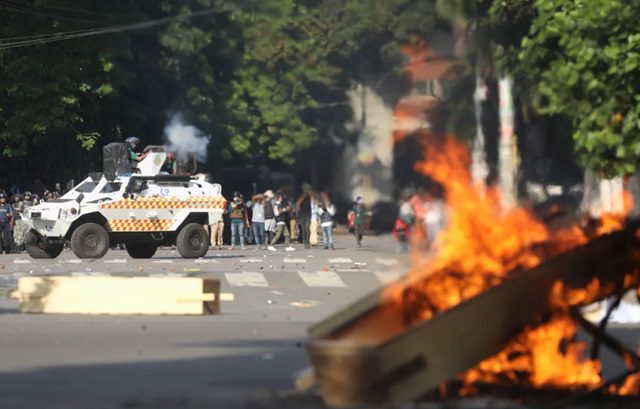BTN News: On Thursday, police in Bangladesh clashed with students who attempted to enforce a “complete blockade” of the capital, Dhaka. This escalation follows several days of violent confrontations during protests against a controversial quota system in public sector jobs. The demonstrations have been ongoing for weeks, with students arguing that the quota system unfairly benefits government allies. The situation intensified on Monday when violent clashes broke out between protesters, police, and pro-government students at Dhaka University, resulting in six deaths on Tuesday. This led the government to order the closure of universities nationwide and prompted police raids on the headquarters of the main opposition party.
Escalating Protests and Government Response
On Wednesday night, protesters announced a nationwide “complete blockade” for Thursday in response to continued police aggression on campuses. The opposition Bangladesh Nationalist Party (BNP) pledged full support for the blockade. Thursday morning saw continued clashes as protesters tried to enforce the blockade. In Dhaka’s Uttara neighborhood, police chased hundreds of demonstrators who had blocked a street while chanting slogans. Elsewhere, police used tear gas and batons to disperse crowds, who retaliated by throwing stones. A spokesman for the Dhaka Metropolitan Police reported that dozens, including officers, were injured in the clashes.
City Under Siege
The protests severely disrupted life in Dhaka, with normally congested streets nearly empty and many shopping centers closed. Although offices and banks remained open, employees faced limited transportation options. Police set up checkpoints around Dhaka University. Local media reported violence in other cities, including Chattogram and Khulna, where protesters blocked major highways. Salma Rahman, an employee at a financial institution in Dhaka, recounted how she left her car at home and opted for a motorcycle ride due to safety concerns. “Our office warned us to be cautious as there is a fear of violence during the blockade,” she said.
Protesters’ Demands and Government Actions
Protesters are calling for the abolition of the quota system that reserves 30% of government jobs for relatives of veterans from Bangladesh’s 1971 independence war. They argue that the system is discriminatory and benefits supporters of Prime Minister Sheikh Hasina, whose Awami League party led the independence movement. In 2018, the Hasina government suspended the quota system following massive protests. However, last month, Bangladesh’s High Court reinstated the quotas after appeals from war veterans’ families, sparking the current wave of protests. The Supreme Court has since suspended the High Court’s ruling and is expected to deliver a decision on August 7. The government has also appealed the High Court’s decision, according to the Attorney General’s office.
Official Appeals and International Attention
In a televised message on Wednesday night, Prime Minister Hasina urged everyone to remain patient until the Supreme Court’s verdict. “I believe our students will get justice from the highest court. They will not be disappointed,” she stated. Despite the growing private sector job market, many prefer government jobs due to their perceived stability and higher pay. Annually, about 400,000 graduates compete for 3,000 government positions through an exam. Hasina also announced a judicial inquiry into Tuesday’s deaths and promised accountability for those responsible.
International and Local Reactions
UN Human Rights Chief Volker Türk called for investigations into all acts of violence and the use of lethal force. He emphasized that freedom of expression and peaceful assembly are fundamental human rights. The ruling party in Bangladesh blamed the opposition BNP for the unrest. On Tuesday night, police raided the BNP headquarters in Dhaka, arresting seven members of its student wing. Detective Chief Harun-or-Rashid reported finding 100 homemade bombs, 500 wooden and bamboo sticks, and several bottles of gasoline during the raid. BNP senior leader Ruhul Kabir Rizvi claimed the raid was a government tactic to divert attention from the protests.
Conclusion
The situation in Bangladesh remains tense as students continue to protest against a job quota system they deem unfair. With ongoing clashes and significant disruption to daily life, the government’s response and upcoming Supreme Court decision are crucial in determining the future of these demonstrations and the quota system. The international community is watching closely, urging respect for human rights and accountability for violence.


